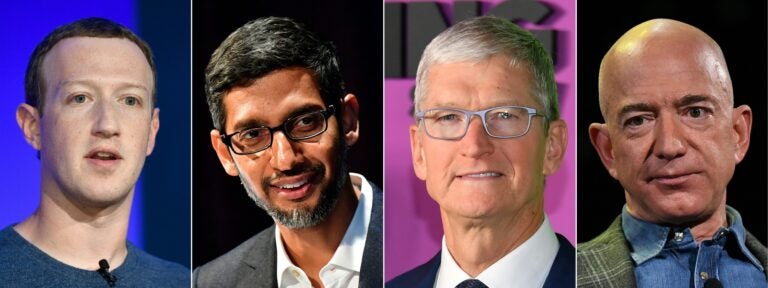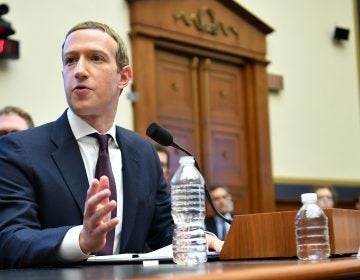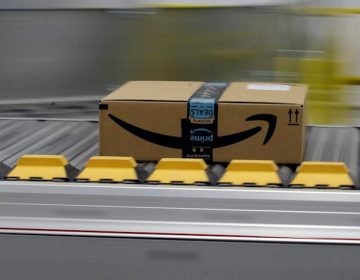How are Apple, Amazon, Facebook, Google monopolies? House report counts the ways

Facebook CEO Mark Zuckerberg (from left), Google CEO Sundar Pichai, Apple CEO Tim Cook and Amazon CEO Jeff Bezos have been in the spotlight over the market power that their giant companies have. (Bertrand Guay/AFP via Getty Images)
In a sweeping report spanning 449 pages, House Democrats lay out a detailed case for stripping Apple, Amazon, Facebook and Google of the power than has made each of them dominant in their fields.
The four companies began as “scrappy underdog startups” but are now monopolies that must be restricted and regulated, the report from Democrats on the House Judiciary Committee’s antitrust panel says.
“These four corporations increasingly serve as gatekeepers of commerce and communications in the digital age, and this gatekeeper power gives them enormous capacity to abuse that power,” a lawyer for the subcommittee said in a briefing with reporters.
The lawmakers say Congress should overhaul the laws that have let the companies grow so powerful. In particular, the report says, Congress should look at forcing “structural separations” of the companies and beefing up enforcement of existing antitrust laws.
The recommendations, if enacted, could radically change how these companies operate. They could, for example, restrict Amazon from selling its own products in its marketplace, in direct competition with sellers who depend on the platform to reach customers, or Google from using the data the Android operating system collects on users and other apps to refine its products.
While the investigation was a bipartisan effort by the subcommittee, the final report has been met by partisan division over its recommendations. The Democratic majority staff authored the report, and no Republicans have publicly endorsed it so far.
Rep. Jim Jordan, R-Ohio, the ranking Republican on the subcommittee, was quick to dismiss the report.
“Big tech is out to get conservatives,” he said in a statement. “Unfortunately, the Democrats’ partisan report ignores this fundamental problem and potential solutions and instead advances radical proposals that would refashion antitrust law in the vision of the far left.”
Democrats say they expect the subcommittee to vote on the report after the House recess.
The report is the culmination of a 16-month long investigation into some of the most valuable and influential companies in the world. Regardless of its uncertain political future and broad recommendations, the report presents a new and fairly comprehensive public database of evidence and internal documents that shed light on long-standing criticisms of Big Tech.
One lawyer for the antitrust subcommittee said one of the most eye-opening discoveries was the fear expressed by competitors in dealing with the tech giants, feeling dependent on their whims.
The tech companies are facing other investigations by federal regulators, state attorneys general and European authorities.
This is a breaking story. We will update it with more details.
Editor’s note: Amazon, Apple, Google and Facebook are among NPR’s recent financial supporters.
9(MDAzMzI1ODY3MDEyMzkzOTE3NjIxNDg3MQ001))




